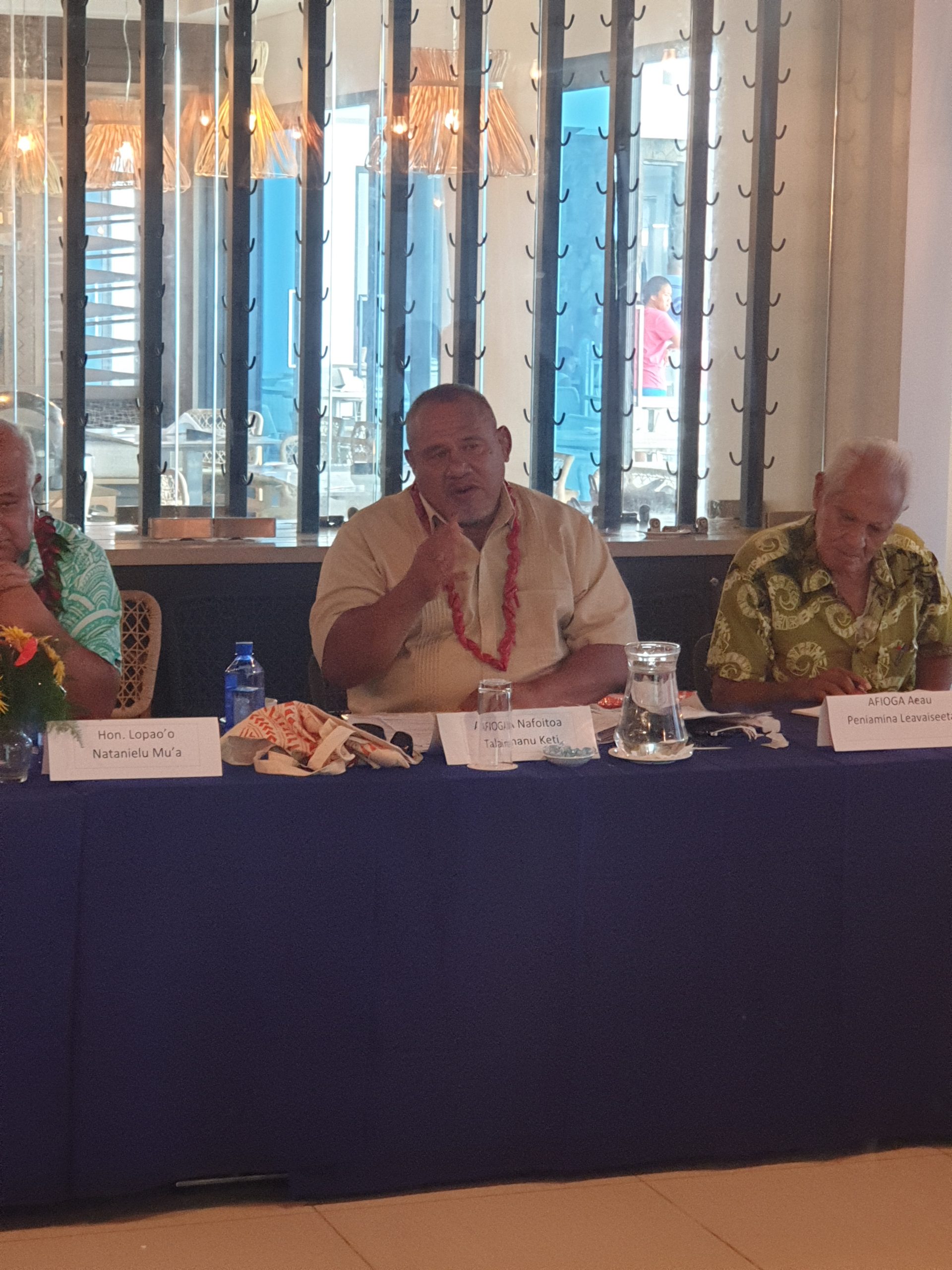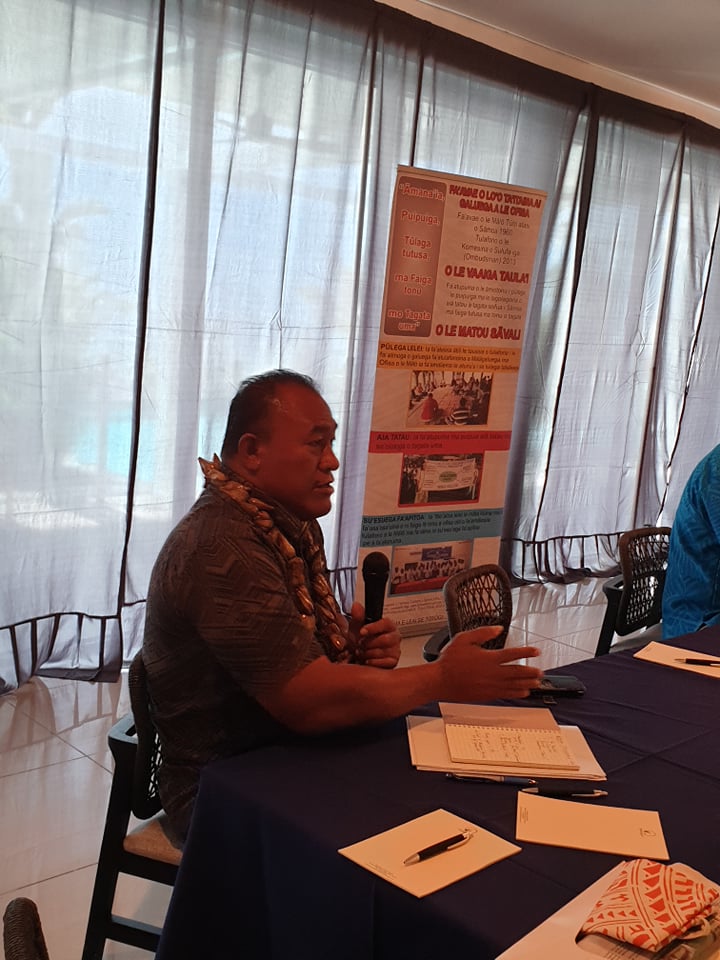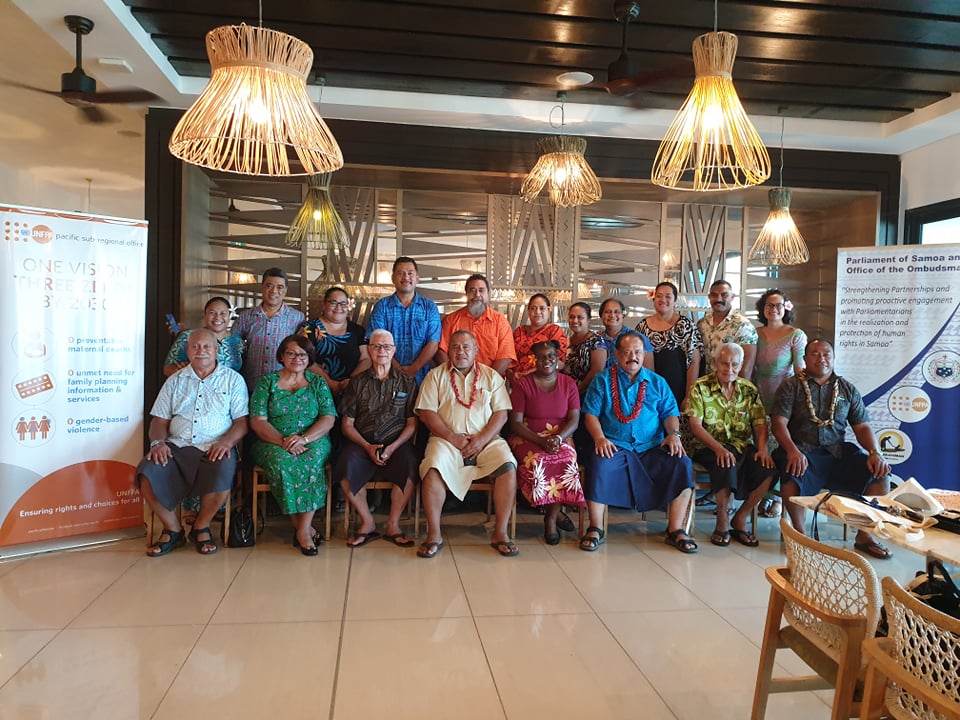The Office of the Ombudsman/National Human
Rights Institution this week conducted its first roundtable dialogue with
Parliamentarians. The aim of the dialogue was to strengthen partnerships and promote
proactive engagement between the Office of the Ombudsman/ National Human Rights
Institution and Parliament in the realization and protection of human rights in Samoa.
The dialogue targeted specific Members of Parliament who have a direct engagement
with the work of the Office particularly the Special Committee tasked to review and
scrutinize the Office’s annual State of Human Rights Reports and Members of
Parliament of villages piloting Recommendation 20 of the National Inquiry into Family
Violence Report 2018. The two days sessions were an opportunity for the Office to
clarify the mandate of the Office and give an insight into some human right issues
commonly raised in annual State of Human Rights Reports.
The Ombudsman, Maiava Iulai Toma, in his opening statement explained the role of
the Ombudsman in Parliamentary democracies as in essence an extension of Parliament
in furthering the effectiveness of the work and responsibilities of Parliament.
“Ombudsman Office assists Parliament in the scrutinizing and holding of the
Government to account for its actions in governance”. He further explained that in the
area of human rights the Ombudsman as the National Human Rights Institutions of
Samoa strives to keep Parliament well informed of the state of human rights in Samoa
and of developments that are vital to the protection and promotion of human rights.
“The Parliament in turn scrutinizes NHRI reports and calls on implicated entities to
answer on matters raised involving them. From these reports Parliament can make
recommendations to Government on actions to enhance the enjoyment of human rights
by the people of Samoa” Ombudsman, Maiava Iulai Toma.
He concluded that a well-functioning democracies, the Ombudsman, the people, the
Parliament, and the administration must form an essential circle of trust. The people
must trust the Ombudsman and the administration must trust the Ombudsman. In turn,
the Ombudsman must trust the administration to accept its recommendations in most
cases and if not, must trust parliament for support. If that trust is damaged in any part of
that circle, the Ombudsman cannot function as it should.
Ms. Ibironke Oyatoye representing UNFPA extends appreciation to members of
Parliament who attended and recognized the important role of Parliamentarians in
society….“Having well-informed Parliamentarians of human rights issues and
challenges mean a better appreciation and debate of human rights issues for the benefit
of people”.
Parliamentarians throughout the two-day sessions were taken through some of the
common misinterpreted human rights issues and unpacking some of the misconceptions
surrounding them that are seen as a barrier hindering Parliamentarians from
thoroughly debating these issues in the house. For example, in discussion of sexual
reproductive health rights, it was important that Parliamentarians were addressed as an
issue that does not represent or mean advocating for just the “physical act of sex” as
many quickly come to understand rather it concerns the overall health and development
of both men and women and about accessibility to health services and information in
order for people to make well and informed decisions about their sexual health. Issues
around freedom of speech, limitations of the exercising of rights, children’s rights, etc.
were also heavily discussed.
It was also an opportunity to address misunderstandings about the National Human
Rights Institution as not an Office established to force foreign ideas such as human
rights in Samoa as many including Parliamentarians come to understand it but an
Office tasked to breach the gap between Government’s international obligations and the
actual enjoyment of human rights in the national level so that Samoa appreciates and
understand human rights from own context. In addition monitor and hold the
Government to account for its human rights obligations.
The MPs had the pleasure of hearing from Ms Katalaina Sapolu on her experience at
the Commonwealth Secretariat as the former Senior Director of Governance and Peace
Directorate.
Ms Sapolu emphasized the important role of Parliament as ‘Guardians of human
rights”. She stressed “well democracies have a system of checks and balances at the
executive, legislative and judicial levels, and each of these levels play its own unique and
vital role in this democratic balance. Alongside this system is the Ombudsman acting as
the National Human Rights Institution, an additional, accountability layer that checks
to see if the system is working to the benefit of people”.
Deputy Speaker, Hon. Nafoitoa Talaimanu Keti acknowledged the importance of
having these sessions done regularly for members of Parliament as a reminder for MPs
who are not familiar with the vital and important role of the Ombudsman as the
auspices of Parliament.
“I am glad these sessions have taken place and I like to see it more often done for
Parliamentarians discussing human rights reports. It's important that we are well
informed of issues raised in the State of Human Rights Reports by Ombudsman Office,
in turn, can better advocate and discuss it…we need a shift of mind-set in our system, a
healthy democracy, and our people are best served when all arms of Parliament are
working in sync supporting and balancing each other’s role”. Deputy Speaker, Nafoitoa
Talaimanu Keti.
The Office acknowledges the support and commitment of Australia Department of
Foreign Affairs and Trade through UNFPA for making this possible.



